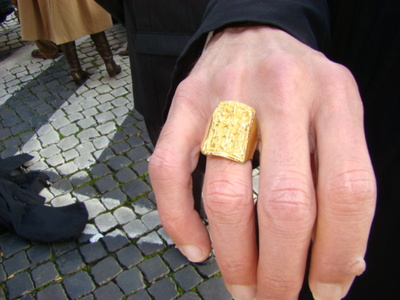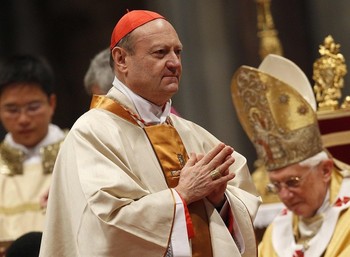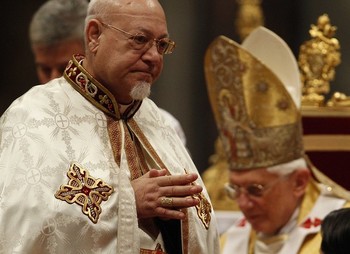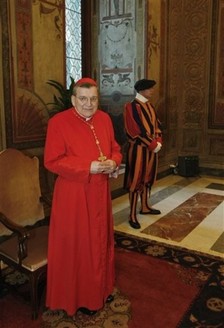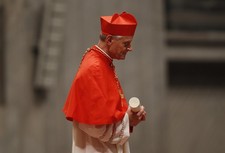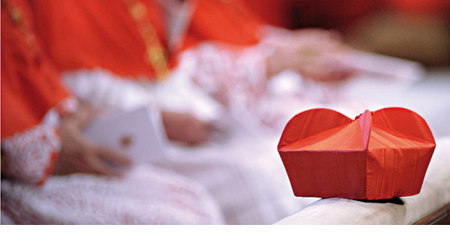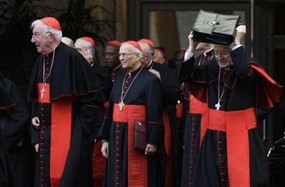Category: Church (ecclesiology)
The two new American Cardinals of the Roman Church
New cardinals assigned a Roman titular church
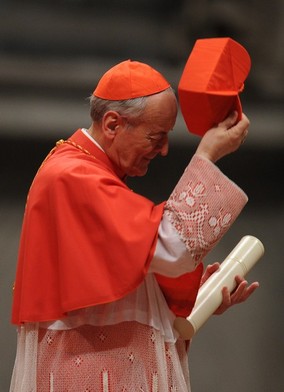 The tradition is that when a cardinal is made by the pope, the cardinal becomes a priest of the Diocese of Rome. As members of the Roman clergy, he receives a church, though now in title only, (which he vicarious takes care of by finding the funding for projects), and has the responsibility of entering a conclave to elect a new pope and when asked, to provide his consultation on certain topics.
The tradition is that when a cardinal is made by the pope, the cardinal becomes a priest of the Diocese of Rome. As members of the Roman clergy, he receives a church, though now in title only, (which he vicarious takes care of by finding the funding for projects), and has the responsibility of entering a conclave to elect a new pope and when asked, to provide his consultation on certain topics.
NOW there’s 24 new cardinals of the Roman Church
The Pope & his cardinals met today
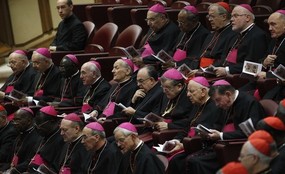 Billed my some as extra-ordinary, but likely seen by insiders as ordinary, Pope Benedict met with his cardinals and the new cardinals –24 of them– he intends to make tomorrow, in a forum where information is exchanged and consultation given. The meeting of Pope and cardinals was conducted in the context of prayer. Prayer and exchange, not the making of decisions was the format. It is estimated that about 150 of the worlds 203 cardinals met today. Topics ranged from the sacred Liturgy and religious freedom, but also the exercise of religion, secularism, conversion and entering into full communion with the Catholic Church to healthcare. Since this is also the 10th anniversary of Dominus Iesus, the document which recalls that salvation comes uniquely and universally through the person of Jesus Christ, the Pope and cardinals will reflect on the impact this document has made since its publication.
Billed my some as extra-ordinary, but likely seen by insiders as ordinary, Pope Benedict met with his cardinals and the new cardinals –24 of them– he intends to make tomorrow, in a forum where information is exchanged and consultation given. The meeting of Pope and cardinals was conducted in the context of prayer. Prayer and exchange, not the making of decisions was the format. It is estimated that about 150 of the worlds 203 cardinals met today. Topics ranged from the sacred Liturgy and religious freedom, but also the exercise of religion, secularism, conversion and entering into full communion with the Catholic Church to healthcare. Since this is also the 10th anniversary of Dominus Iesus, the document which recalls that salvation comes uniquely and universally through the person of Jesus Christ, the Pope and cardinals will reflect on the impact this document has made since its publication.
Cardinals to pray & discuss about Dominus Iesus, sex abuse, Ordinariate for Anglicans wishing to be Catholic
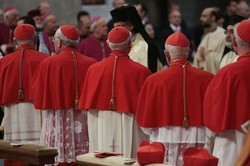 Anna Arco’s article online at the Catholic Herald (of the UK fame) reports that before the consistory of cardinals on November 20, during which the Pope will create 24 new cardinals there will be prayer, reflection and conversation about a number of things but three key topics will be the 10th anniversary of Dominus Iesus, sex abuse crisis and the Ordinariate for Anglicans who desire to enter into full communion the Catholic Church. Other issues to be discussed, but no less crucial to the life of the Church, are religious liberty and the sacred Liturgy.
Anna Arco’s article online at the Catholic Herald (of the UK fame) reports that before the consistory of cardinals on November 20, during which the Pope will create 24 new cardinals there will be prayer, reflection and conversation about a number of things but three key topics will be the 10th anniversary of Dominus Iesus, sex abuse crisis and the Ordinariate for Anglicans who desire to enter into full communion the Catholic Church. Other issues to be discussed, but no less crucial to the life of the Church, are religious liberty and the sacred Liturgy.
24 New Cardinals named by Pope Benedict today
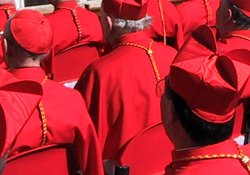 The Pope announced his intention to name 24 new cardinals of the Holy Roman Church today. The public consistory is scheduled for November 20 and it is at this ceremony that the Holy Father’s intention becomes official, becoming members of the College of Cardinals. The new cardinals will have their names in inscribed in the list of “Roman priests” who are deputed to elect the Bishop of Rome.
The Pope announced his intention to name 24 new cardinals of the Holy Roman Church today. The public consistory is scheduled for November 20 and it is at this ceremony that the Holy Father’s intention becomes official, becoming members of the College of Cardinals. The new cardinals will have their names in inscribed in the list of “Roman priests” who are deputed to elect the Bishop of Rome.
This is the third time the Holy Father has created cardinals since his becoming Pope in 2005. Previous consistories were in 2006 and 2007. The new cardinals reflect the various competences the Church relies upon to preach the Gospel and to serve the Church.
- Italians
Archbishop Angelo Amato, SDB, Prefect of the Congregation of Saints
Archbishop Mauro Piacenza, Prefect of the Congregation of Clergy
Archbishop Fortunato Baldelli, Major Penitentiary
Archbishop Velasio De Paolis, CS, President of the Prefecture of the Economic Affairs of the Holy See
Archbishop Paolo Sardi, Vice-Chamberlain of the Apostolic Chamber and Patron of the Order of Malta
Archbishop Francesco Monterisi, Archpriest of the Basilica of Saint Paul outside the Walls
Archbishop Gianfranco Ravasi, President of the Pontifical Council of Culture
Archbishop Paolo Romeo, Archbishop of Palermo
- North Americans
Archbishop Raymond Leo Burke, Prefect of the Supreme Tribunal of Apostolic Signatura
Archbishop Donald William Wuerl, Archbishop of Washington, DC
- Other Europeans
Archbishop Kurt Koch, President of the Pontifical Council for the Unity of Christians
Archbishop Reinhard Marx, Archbishop of Munich and Freising
Archbishop Kazimierz Nycz, Archbishop of Warsaw
- Africa
Archbishop Robert Sarah (Guinea Conakry), President of Cor Unum
Archbishop Medardo Mazombwe, Emertius Archbishop of Lusaka
Archbishop Laurent Monsengwo Pasinya, Archbishop of Kinshasa
- Asia
Archbishop Malcom Ranjith Patabendige Don, Archbishop of Colombo
- Eastern Church
His Beatitude, Patriarch Antonio Naguib, Patriarch of Alexandria of the Copts
- South America
Archbishop Raymundo Damasceno Assis, Archbishop of Aparecida
Archbishop Raul Eduardo Vela Chiribogo, Emeritus Archbishop of Ecudor
- The Over 80 Cardinals
Msgr. Domenico Bartolucci, Emeritus Master of the Sistine Chapel
Msgr. Walter Brandmüller, Emeritus President of the Pontifical Commission of Historical Sciences
Bishop Elio Sgreccia, Emeritus President of the Pontifical Academy of Life
Archbishop Jose Manuel Estepa Llaurens, Emeritus Ordinary of the Spanish Military
Read journalist John Allen’s analysis of the new cardinals: John Allen the new cardinals 2010.pdf
Synod of Bishops for the Middle East
The Synod meets from October 10-24.
Supporting Catholic Schools
This morning the Archbishop of Hartford, Henry J. Mansell hosted what has become the annual Columbus Day Breakfast to provide scholarship grants to students attending Catholic elementary schools in greater New Haven. The Archbishop assisted by the Foundation for the Advancement of Catholic Schools helped us to look with fresh eyes at the need for Catholic education in greater New Haven. I am very happy to have been invited to attend this morning’s breakfast.
Sacred Duties, Episcopal Ministry: what’s wrong with the US Conference of Bishops
Few people in these parts (in the Eastern part of the USA) know the name Robert F. Vasa except ecclesial-philes like myself, but that’s because he’s on the other side of the country. Never mind. Who could say with honesty that there’s a genuine concern for knowing ecclesial affairs viz. from a person who has little name recognition such as Robert Vasa. That is, until now, who, with some excellent, even controversial ideas, is sure to anger the round heads. Only now Vasa’s thinking is gaining some currency. But let’s give him his just due respect. Robert F. Vasa, 59, is the Bishop of Baker, OR, a priest of the Lincoln Diocese who delivered an extraordinarily good address titled, “Sacred Duties, Episcopal Ministry” on September 16, 2010 at the 2010 InsideCatholic Partnership Award Dinner in Washington, DC, that has not received the attention it deserves.
